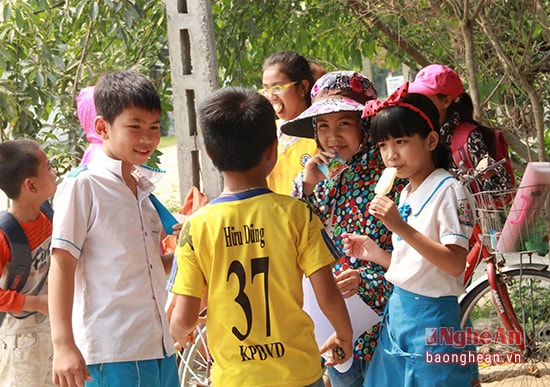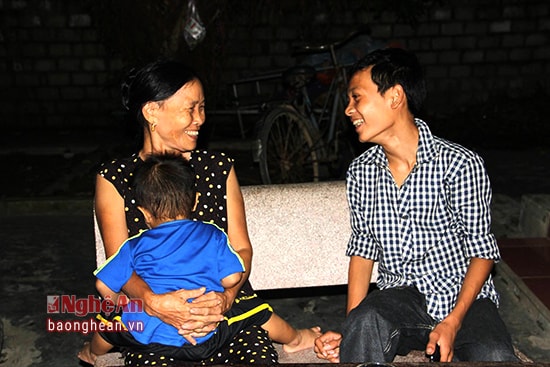The land with the most 'cool' accent in Nghe An
(Baonghean.vn) - Nghi Loc is known as one of the areas with the most distinctive accent in Nghe An with a spoken language without accents, many sounds are changed in tone and color, and many dialect words are used. And although they are also 'Nghi Loc' people, the accent of the 'Phuc - Thai - Tho' area is completely different from the rest of this district.
 |
| Nghi Thai people in a festival at the beginning of the year. |
Watch the clip of a Nghi Thai guy telling the story of "The Lice":
The communes of Nghi Thai and Phuc Tho have always been collectively called 'Phuc Thai Tho'. The people of these communes live in the same geographical area and share the same accent and customs. "Ca co cuong, ca co doi" (ca co cuong, ca co tai) is their way of speaking. Although they have common features, the local residents can still distinguish 6-7 different accents even in the same commune like Nghi Thai. The difference in each accent is based on the pitch and the pronunciation. The common characteristic of the spoken language in the Phuc Thai Tho region is that the sentences have lost their accents, using many dialect words and have changed their tones such as: 'toi - garlic, shin - foot, oi - basket, gon - cou; cho ma - but ma, di tay - go kia, hung lo cay ray - if you miss the job, you are embarrassed'...
 |
| Children in Nghi Thai |
Nghi Loc people often compose and pass on many poems and rhymes in their hometown accent with affection and pride. Nowadays, on forums and social networks, it is not difficult to find poems, songs and rhymes in Nghi Loc accent. True stories are told with humor and an unmistakable accent that many people do not understand but still find very funny.
A poem written by a scholar to a salesgirl from Quynh Luu, passed down through many generations of the people of 'Phuc Thai Tho', is an example:
How old is the seller?
Is the water still hot or cold?
On the lower slope, a bundle of rice is quietly harvested.
Below are some bananas growing sparsely.
Thin cake, thick cake are both smooth
Taro and sweet potato must be dipped in salt...
Mean:
How old is the water seller?
Is your water hot or cold?
A package of spring rolls hangs on the ground.
A few bananas hanging under the hook
Thin and thick cakes are both greasy.
Taro and sweet potato must be dipped in salt.
 |
| Wherever Phuc Thai Tho people go, they never lose their distinctive accent. |
When we asked the oldest people in the 'Phuc Thai Tho' region about the origin of the accent, no one in the 'Nghi Loc language' region understood why their people spoke like that. They only knew that, when they were born, they heard their grandparents and parents speak and every child here was soon passed on this special accent from the moment they learned to speak. This is how it is passed down from generation to generation with a familiar and unmistakable accent. People in Nghi Thai, Phuc Tho find it very difficult to change their accent when communicating with people outside the region. That is why they often use common words with their native accent when communicating with people from outside the region.
In addition to losing accents when speaking and speaking quickly, Phuc Tho people also use some filler words at the beginning or end of sentences such as: 'woa', the voice is also lengthened, making many people feel like it's an interjection...
Let's watch the dialogue clip of the people of 'Phuc Thai Tho' area:
A conversation between two girls from Phuc Tho. The older one is named Thao, the younger one is named Nga:
- Wow, where are you going, Nga?
- Nga went to Ms. Binh's house to come back. Ms. Thao got Nga some water! (Nga went to Ms. Binh's house to come back. Ms. Thao got Nga some water)
- Why didn't you call Thao when you left? What a pity!
Not only do Phuc Tho people speak with an unpleasant accent, they also use dialects and local languages such as: 'nac is water, kenh - rice, moi - salt, coi - yard, doi - bowl,...'
In Nghi Loc, there are many communes with different ways of speaking. Each language is difficult to hear and understand. Even in a commune, there are many villages separated by only one road or canal, and the accents are different. And the people of 'Phuc Thai Tho' are still proud of their uniqueness compared to 'the rest'. Even if people in this area travel all over the world, they can recognize each other, find each other, and get closer just by hearing their accents.
Linguists believe that the reason for this difference is primarily the phenomenon of “similarity” in tones. But in essence, to the ears of common Vietnamese speakers, they are “similar”, but to native speakers, the Vietnamese tones here are still “perceived” differently. This phenomenon is considered very “normal”. Because, no matter how difficult to hear, the voices of the residents here are still the voices of genuine Vietnamese speakers. It’s just that the voices either retain a rather ancient state of Vietnamese or have quite “special” changes in sound compared to the common voice.
The accent of the 'Phuc Thai Tho' people is not only a cultural beauty in the lives of the people here but also contributes to enriching the Nghe language and culture of the Nghe people.
Vuong Van - Lan Thai
Technique: Duong Tuan
| RELATED NEWS |
|---|
